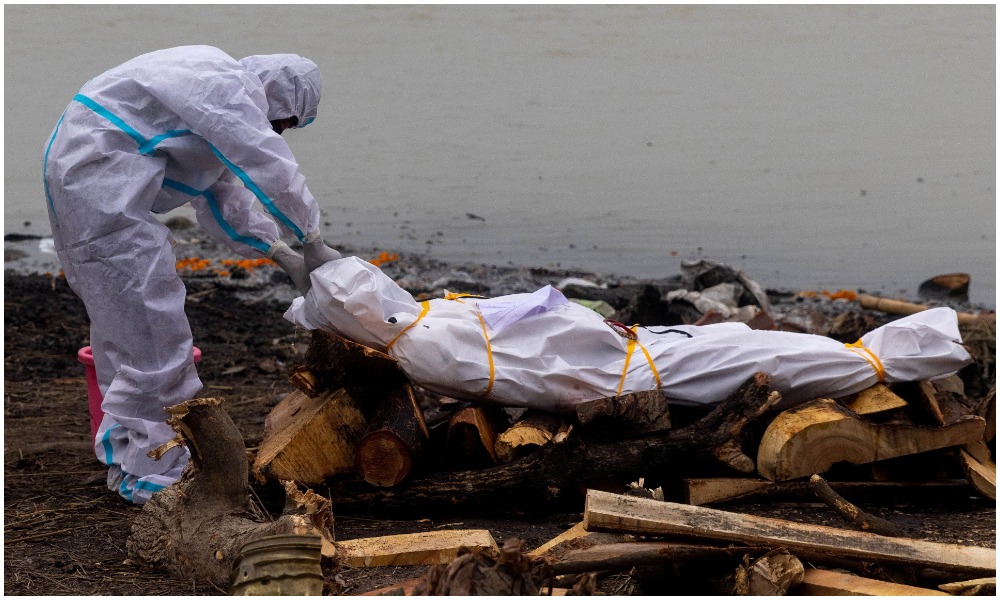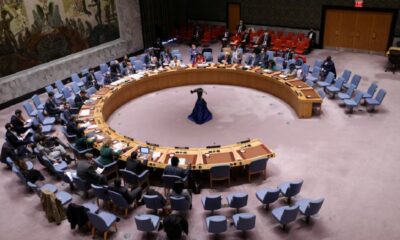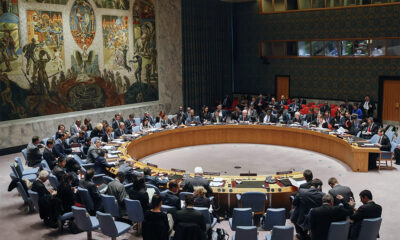COVID-19
COVID-19 victims among the bodies dumped in India’s Ganges

Bodies of COVID-19 victims have been found dumped in some Indian rivers, a state government letter seen by Reuters says, in the first official acknowledgement of the alarming practice, which it said may stem from poverty and fear of the disease in remote areas.
Images of corpses drifting down the Ganges river, which is considered holy in Hinduism, have shocked the country, reeling under the world’s worst surge in COVID-19 cases.
Although media reports have linked the increase in the number of bodies found floating in the river and its tributaries in recent days to the pandemic, India’s northern state of Uttar Pradesh, home to 240 million people, has until now not publicly revealed the cause of the deaths, Reuters reported.
“The administration has information that bodies of those who have succumbed to COVID-19 or any other disease are being thrown into rivers instead of being disposed of as per proper rituals,” a senior state official, Manoj Kumar Singh, said in a letter dated May 14 to district heads that was reviewed by Reuters.
“As a result, bodies have been recovered from rivers in many places.”
Singh was not immediately reachable for comment.
The acknowledgment comes as Prime Minister Narendra Modi on Saturday called on officials to strengthen healthcare resources in rural areas and step up surveillance as the virus spreads rapidly in those areas after ravaging the cities.
Uttar Pradesh, home to more people than Brazil or Pakistan, has been badly hit by India’s dramatic second surge in COVID-19 cases. Health experts say many cases are now going undetected in the villages of Uttar Pradesh, where most of its people live.
Singh in the memo to district heads said a lack of funds to buy materials like firewood for cremation, religious beliefs in some communities, and families abandoning COVID-19 victims for fear of the disease, were among the likely reasons for the surge in body dumpings, Reuters reported.
He asked village-level officials to ensure no corpses are thrown into water and said the state government would pay poor families of the dead 5,000 rupees ($68) each to cremate or bury bodies. The state has also asked police to patrol rivers to stop the practice.
India has been officially reporting around 4,000 deaths each day from the disease for nearly two weeks, but health experts say the toll is likely much higher due to poor testing in rural areas and other factors.
The jump in deaths has in many places led to backlogs at crematoriums and multiplied the cost of last rites.
Uttar Pradesh spokesman Navneet Sehgal on Saturday denied local media reports that as many as 2,000 corpses of potential COVID-19 victims had been recovered from rivers in the state and neighbouring Bihar in recent days.
“We keep recovering 10 to 20 bodies every now and then,” Sehgal told Reuters, adding that some riverside villages did not cremate their dead due to Hindu traditions during some periods of religious significance.
Bihar officials did not respond to requests for comment.
COVID-19
WHO declares end to COVID global health emergency

The World Health Organization said Friday that COVID-19 no longer qualifies as a global emergency, marking a symbolic end to the devastating coronavirus pandemic that triggered once-unthinkable lockdowns, upended economies and killed millions of people worldwide.
The announcement, made more than three years after WHO declared the coronavirus an international crisis, offers some relief, if not an ending, to a pandemic that stirred fear and suspicion, hand-wringing and finger-pointing across the globe, AP reported.
The U.N. health agency’s officials said that even though the emergency phase was over, the pandemic hasn’t finished, noting recent spikes in cases in Southeast Asia and the Middle East.
WHO says thousands of people are still dying from the virus every week, and millions of others are suffering from debilitating, long-term effects.
“It’s with great hope that I declare COVID-19 over as a global health emergency,” WHO Director-General Tedros Adhanom Ghebreyesus said.
“That does not mean COVID-19 is over as a global health threat,” he said, warning that new variants could yet emerge. Tedros noted that while the official COVID-19 death toll was 7 million, the real figure was estimated to be at least 20 million.
Tedros said the pandemic had been on a downward trend for more than a year, acknowledging that most countries have already returned to life before COVID-19.
He bemoaned the damage that COVID-19 had done to the global community, saying the pandemic had shattered businesses, exacerbated political divisions, led to the spread of misinformation and plunged millions into poverty.
When the U.N. health agency first declared the coronavirus to be an international crisis on Jan. 30, 2020, it hadn’t yet been named COVID-19 and there were no major outbreaks beyond China.
More than three years later, the virus has caused an estimated 764 million cases globally and about 5 billion people have received at least one dose of vaccine.
In the U.S., the public health emergency declaration made regarding COVID-19 is set to expire on May 11, when wide-ranging measures to support the pandemic response, including vaccine mandates, will end. Many other countries, including Germany, France and Britain, dropped most of their provisions against the pandemic last year.
When Tedros declared COVID-19 to be an emergency in 2020, he said his greatest fear was the virus’ potential to spread in countries with weak health systems.
Most recently, WHO has struggled to investigate the origins of the coronavirus, a challenging scientific endeavor that has also become politically fraught.
COVID-19
COVID-19 in Iran: Nearly 900 new cases, 24 deaths recorded

The Iranian health ministry announced on Sunday that more than 890 new cases of COVID-19 have been identified across the country during the past 24 hours, adding that 24 patients have died in the same period of time, Fars News Agency reported.
“A sum of 891 new patients infected with COVID-19 have been identified in the country based on confirmed diagnosis criteria during the past 24 hours,” the Iranian Health Ministry’s Public Relations Center said on Sunday, adding, “454 patients have been hospitalized during the same time span.”
The ministry’s public relations center said 611 people infected with COVID-19 are in critical condition.
COVID-19
China says 200 million treated, pandemic ‘decisively’ beaten

China says more than 200 million of its citizens have been diagnosed and treated for COVID-19 since it lifted strict containment measures beginning in November.
With 800,000 of the most critically ill patients having recovered, China has “decisively beaten” the pandemic, according to notes from a meeting of the ruling Communist Party’s all-powerful Politburo Standing Committee presided over by President and party leader Xi Jinping, AP reported.
China enforced some of the world’s most draconian lockdowns, quarantines and travel restrictions and still faces questions about the origins of the virus that was first detected in the central Chinese city of Wuhan in late 2019. Heavy-handed enforcement prompted rare anti-government protests and took a heavy toll on the world’s second-largest economy.
The official Xinhua News Agency quoted Xi as saying that policies to control the outbreak had been “entirely correct.” The abrupt lifting in November and December of the “zero COVID” policy that had sought to eliminate all cases of the virus led to a surge in infections that temporarily overwhelmed hospitals.
Case numbers have since peaked and life has largely returned to normal, although international travel in and out of China has yet to return to pre-pandemic levels.
China is now transitioning to a post-pandemic stage after a fight against the outbreak that was “extraordinary in the extreme,” Xinhua said.
The government will continue to “optimize and adjust prevention and control policies and measures according to the times and situations with a strong historical responsibility and strong strategic determination,” Xinhua said.
-

 Sport4 days ago
Sport4 days agoACL draw to be broadcast live on ATN channels
-

 Regional4 days ago
Regional4 days agoIRGC chief warns of harsher response if Israel attacks Iran
-

 Regional4 days ago
Regional4 days agoIran launches retaliatory attack on Israel with hundreds of drones, missiles
-

 Sport3 days ago
Sport3 days agoACL fever grows as fixtures finalized
-

 Latest News4 days ago
Latest News4 days agoContact group on Afghanistan hits roadblock over Pakistan’s gripe with India
-

 Sport4 days ago
Sport4 days agoHetmyer powers Rajasthan win in low-scoring IPL thriller
-

 World4 days ago
World4 days agoUN Security Council to meet Sunday on Iran attack
-

 World3 days ago
World3 days agoUS will not take part in any Israeli retaliatory action against Iran

























